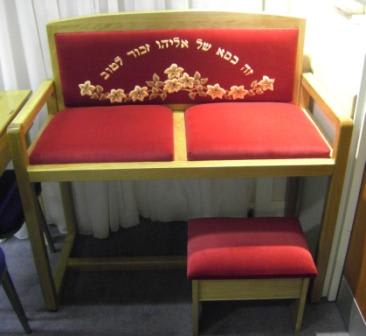A central theme of the Motzei Shabbat hymns is Eliyahu the prophet. Kitzur Shulchan Arukh gives two reasons for this association:
- Our prophets foretold that Eliyahu, who never died but rather ascended skyward in a fiery chariot (II Kings 2:11), will return to augur the coming of the Moshiach (Malakhi 3:23). However, so great is the importance of Shabbat that even heralding the arrival of Moshiach does not disturb our Sabbath rest, nor even our Sabbath preparations! (Pesachim 13a). When we refer to Shabbat as “like the world to come”, it is not hyperbole. Shabbat belongs so much to the future perfect world of the Redemption, that heralding the Redemption itself is delayed in order to make way for Shabbat.
- The Kitzur cites a Midrash (mentioned in many works but lost to us) which relates that each Motzaei Shabbat Eliyahu “sits under the tree of life and relates the praises of Israel, who keep the Shabbat”.
This Midrash relates to Eliyahu as the witness of Israel’s righteousness. The Zohar relates how Eliyahu attained this status.
Even after Eliyahu performed the amazing miracle at Mount Carmel, where fire descended from heaven and consumed his drenched offering, and all the Jews were inspired to exclaim, “HaShem is the [only] G-d, HaShem is the [only] G-d” (I Kings 18), he soon found himself again a lonely, pursued figure, and fled to the desert. There, he bewailed his fate. He protested his zealousness for HaShem’s honor, and complained that the Jews “have abandoned Your covenant” (I Kings 19:10).
The response to this moving complaint is very surprising. Instead of congratulating Eliyahu for his zeal and devotion, HaShem seems to rebuke him for his lack of confidence in God’s people. Eliyahu is assigned to a remarkable “probation”, which is simultaneously punishment and reward: he will person- ally witness each and every Brit Mila throughout Jewish history! (Zohar Lekh Lekha I:93a.) The restless wandering needed to fulfill this mandate is a kind of punishment for Eliyahu’s hasty words regarding the Jewish people, but his reward is to witness personally the most important thing of all to Eliyahu, that the Jews should indeed be loyal to their covenant with G-d, is in fact being fulfilled throughout the generations.
(This story is the basis of the custom for having a “chair of Eliyahu” at a Brit, for the Zohar then explains that we should always be careful to provide a chair for this distinguished guest.)
Havdala – a symbolic reenactment of Eliyahu’s ascent to heaven
Perhaps we can discern a hint of a third connection between havdala and Eliyahu: the havdala ceremony itself can be seen as a symbolic re-enactment of Eliyahu’s ascent to heaven.
Eliyahu had a rare prophetic spirit. He was able to inspire masses of Jews more than any other prophet since Moshe. We could well liken him to the “neshama yeteira”, the “extra soul”, of the Jewish people. Through Eliyahu, the people experienced a unique spiritual elevation.
However, the time came for Eliyahu’s mission to end. He was ordered to appoint a successor, Elisha, and leave this world. This is like the end of Shabbat, and the departure of the extra soul.
Elisha was not willing to let Eliyahu disappear so abruptly. He requested that Eliyahu grant him “a double measure of your spirit” (II Kings 2:9). Although Eliyahu himself would be gone, the Jewish people would be consoled by the prophetic spirit of Elisha. This reminds us of the spices, which “restore the soul” in consolation for the lost extra soul which dwelt within us on Shabbat (Bach OC 297 based on Tosafot Beitza 33).
Finally, Eliyahu ascended skyward in a fiery chariot with horses of fire. This is symbolized by the fires of the havdala candle, with its multiple wicks.
We close havdala with recognition of the fine distinctions between the holy and the profane. This too reminds us of Eliyahu, because our Sages have a tradition that in the future Eliyahu will come to resolve all of our doubts, particularly unresolved uncertainties in the halakha which is the ultimate arbiter of holy and profane (Shabbat 108a and elsewhere).
Rabbi Asher Meir is the author of the book Meaning in Mitzvot, distributed by Feldheim. The book provides insights into the inner meaning of our daily practices, following the order of the 221 chapters of the Kitzur Shulchan Aruch.
The words of this author reflect his/her own opinions and do not necessarily represent the official position of the Orthodox Union.
